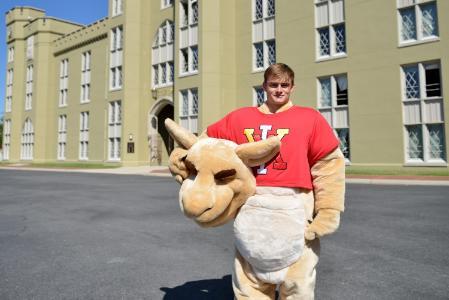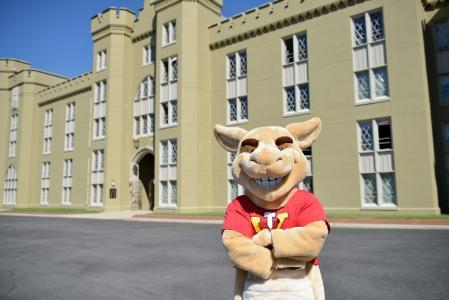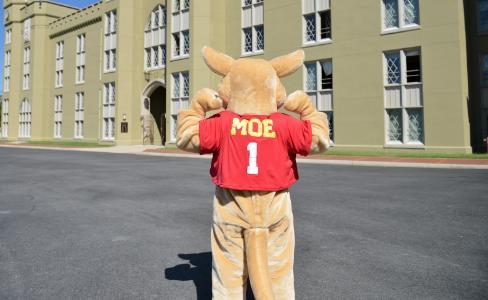Stealing a Moe-ment With VMI’s Mascot

Bowlman “Tee” Bowles IV ’26 is one of two cadets who serve as the mascot, Moe, during functions at Virginia Military Institute. -VMI Photo by Laura Peters Shapiro
LEXINGTON, Va. Sept. 9, 2024 — Atop the kangaroo head, there’s a small vent and a fan. Bowlman “Tee” Bowles IV ’26 says it gets hot under there. The fan helps, but it’s often sweltering inside the faux kangaroo costume.
He also needs a handler walking him around — he can barely see.
Bowles is one of two cadets who serve as the mascot, Moe, during functions at Virginia Military Institute. The history major, who will be commissioning into the U.S. Army following his time at VMI, joined the Corps of Cadets S9 regimental staff his 3rd Class year. S9 staff are responsible for all issues related to NCAA athletics and club sport events.
He chose S9 because he had similar duties in high school — working with the sports team, commentating on games, doing social media, and so on. A big draw was the opportunity to become Moe.
“Every time I watched basketball games, I saw mascots doing stupid things and fooling around with other teams and stuff. I got inspired by seeing those mascots on TV, which gave me interest to do the Moe costume,” he said.
Moe is a staple around post. He’s present for home football games, pep rally, and other home sporting events. The mascot is around for pictures and overall, a boost in morale.
"We're there for the rats,” Bowles said.
Moe is a key part of the Keydets, specifically with family, friends, alumni, and other guests in attendance at events, Bowles said. That means a lot of pictures being taken — aided specifically by Moe’s handler — and overall hyping of the crowd. This year features a new costume for the mascot. Bowles said the previous suit was falling apart and needed to be replaced. He came in this year and a new suit was there.
“In the Moe costume, you have to look down when taking pictures. The eyes are looking up. Whenever I'm taking pictures, I'm literally looking at the ground,” explained Bowles, hence the need for the handler.
Bowles says the handler will tap him on the shoulder when people ask for photos and help him maneuver around the crowd, especially at Foster Stadium.
“The steps are really steep and hard to get up in those big feet,” he said.
Bowles shares the responsibility with Carter Rees ’27. Rees just started as Moe at the start of the 2024-25 academic year.
“I love feeling the energy of a crowd, so the opportunity to be at the center of creating that energy was an easy decision for me,” Rees said. “My favorite part of being Moe is making people happy. Whether that's getting the Corps hyped up or taking pictures with people, I love seeing smiles on people's faces.”
Bowles said he tries to break some of the tension during the games, especially any stresses that the rats are facing.
“It’s super easy to interact with the rats,” he said. “I love going up there and messing with them. Like I'd sit down next to rats and take their drinks and stuff, act like I'm drinking it.”
He’s also trying to bridge the divide that can sometimes be seen between the Corps and athletics.
“There's this stigma that the Corps is detached from athletics, that athlete, non-athlete divide,” he said. “I think Moe can definitely help unlock that by interacting with them as rats, because I can help them unlock interest in athletics.”
The history behind Moe
The history behind Moe and the Keydets is a little complicated.
Keydets have been the term to describe VMI’s athletic teams, although where it originated isn’t clear. While a Keydet is not a kangaroo, the animal was chosen as the mascot in 1947, when two VMI cheerleaders saw a picture of a kangaroo on the front of a magazine and realized how uncommon the animal was as a mascot. Originally named TD Bound, the mascot was renamed Moe later, to appeal to all VMI athletics, not just football.
It’s said that the term Keydet could have come from the United States Military Academy’s term used to denote the gray of the standard uniform of a cadet. Another definition, one that hasn’t been factually substantiated, due to the Southern drawl of some members of the Corps, the pronunciation of cadet morphed into Keydet.
VMI has been associated with several nicknames, one of the longest was the Flying Squadron, which referred to the football team. The Flying Squadron nickname started in 1917 at a football game between VMI and North Carolina and it stuck, becoming most popular during the 1920 season. It wasn’t until the 1930s that the term Keydet became associated with VMI athletic teams.
Learn more here.
Laura Peters Shapiro
Communications & Marketing
VIRGINIA MILITARY INSTITUTE
.svg)
.png)

